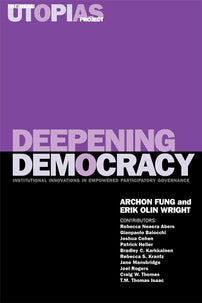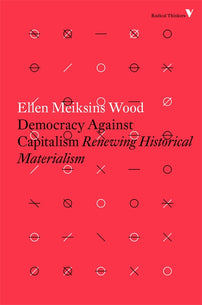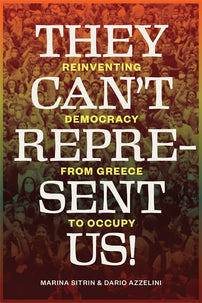Radicalising democracy: How Hannah Arendt's legacy endures in Barcelona
In an era in which public trust in political institutions is faltering, could the legacy of Hannah Arendt offer a new departure for democracy? Hettie O'Brien analyses Arendt's model of council democracy, and how Barcelona en Comú are transforming the way democracy works.

In 1963, having fled Germany for New York, political philosopher Hannah Arendt wrote that: “no one could be called either happy or free without participating, and having a share, in public power”. Had she been alive to witness Brexit, the ascendancy of Donald Trump, and the election of Jair Bolsonaro, Arendt would likely have lamented liberals’ ongoing faith in representative democracy.
Public trust in political institutions is faltering. While the right has rallied behind fascistic strongmen, progressives are turning instead towards projects that decentralise political power. In Barcelona, a quiet revolution is underway. Elected platform Barcelona en Comú is the inaugural project in a growing movement of “fearless cities” intent on radicalising democracy by involving as many people as possible. Elected governments in Madrid, Grenoble, Padua and Valencia reflect Arendt’s contention that true democracy involves locals debating and deciding on political matters.
Arendt’s analysis of modern democracy starts with the French and American revolutions. The spirit that animated these revolutions was, to Arendt’s dismay, lost in the proceeding centuries. Modern citizens were neutered of their political freedoms; where they gained civil liberties and elected parties, they conceded the power to actively participate in political governance. As Arendt wrote, “political freedom, generally speaking, means the right to be a participator in government or it means nothing.” It was insufficient, she thought, to merely pursue a Hobbesian blueprint where people transfer their powers of self-governance to a sovereign institution that acts on their behalf.
Her disillusion with representative democracy was born from personal experience. Arendt, a Jew who had witnessed the rise of National Socialism in Germany, identified how public distrust in a system of representative parties created fertile ground for a “mob mentality” that scapegoated outsiders. Rather than moderating extremism or sheltering political minorities, Arendt saw representative democracy as part of the problem. It restricted citizens’ interests to the private domain, offering no forum for hearing others’ opinions or debating ideas in public. In a parliamentary democracy, the only arena of political expression is the ballot box – a blunted implement that can be captured by the tyranny of majority opinion.
To answer these shortcomings, Arendt advanced her model of council democracy. Her idea was simple: local people would meet in assemblies to discuss political matters and choose individuals to represent their interests in councils higher up.
These ideas were inspired by Athenian democracy, where citizens debated politics in the public realm of the polis – the city-state. In Athens this was the place for political matters, while oikos – the home – was the private domain of the family, women and slaves. “The only indispensable material factor in the generation of power is the living together of people”, Arendt remarked in her 1958 book The Human Condition, and the city-state is “paradigmatic for all Western political organisation”.
But Arendt’s definition of what counted as “political” proved to be the theory’s undoing. Stripped of its original historic context, Arendt’s model of council democracy has since been derided as a utopian thought experiment.
“Topics which allow certainty are the province of specialists, not the public at large”, she wrote. In part, her separation of politics from procedure grounded council debates. Politics had to end somewhere, otherwise everything could be political, and discussion would spin into infinite regress. She assumed that technical, scientific and economic matters were politically neutral. Political questions, distinct from the realm of management and procedure, were those that could not be answered with facts.
Arendt’s delineation recalled the ancient idea of “techne”, a type of knowledge that signified technology and craft and was distinct from the free-thinking debates of the deliberative polis. “Truly political topics always allow the possibility of disagreement among rational actors… and always allow choice”, Arendt wrote.
It was this distinction that cost her theory its reputation. At a 1972 roundtable discussion in Toronto, German philosopher Albrecht Wellmer asked Arendt to give an example of a social problem that was technical, but not political. “Take anything: like education, or health, or urban problems, even the simple problem of living standards”, he said.
Arendt responded that each of these problems has a “double face” – and one of these faces “should not be subject to debate”. She then cited an example of a non-debatable question: “how many square feet every human being needs in order to be able to breathe and to live a decent life”. Her point was self-defeating: the word “decent” is inflected with subjectivity.
Arendt desired a political system that involved citizens directly, but she narrowed her definition of politics so far that it became little more than gesture and speech. In her search for true political freedom, she ignored how the institutions of technology, science and economics circumscribe all political life.
Yet although her theory was logically flawed, Arendt’s lucid criticisms of representation foretold today’s disenchantment with political institutions. The troubling distinction between the political and the technical speaks to the contemporary search for a politics beyond technocracy – one that registers human experience and emotion.
Where does the political end, and the managerial begin? How far can the state be transformed to involve citizens in the practice of government, and what are the limits of political debate? Should citizens be given a say in all political questions, no matter how technical? These questions afflict contemporary politics, from municipal movements building town-hall democracy to John McDonnell’s attempts to transform the state and “gain power to empower”.
Arendt had few real-life examples of council democracy. She pointed to the Paris Commune, the Russian Soviets of 1905 and 1917, and the spontaneous councils of the 1956 Hungarian revolution. Projects of this sort became her ideal type, forged in times when participation was a matter of life and death. As her critic Margaret Canovan noted, “extraordinary politics of this kind… [are] something exceptional and can never be a complete substitute for the more mundane politics of interests”. In revolution and war, politics gains an urgency that cannot be replicated. The challenge is guaranteeing that citizens of every stripe will participate in the everyday practice of democracy.
Had she been alive today, Arendt may have looked instead to Barcelona’s government and Europe’s fearless cities movement for examples of council democracy in practice. Barcelona en Comú’s horizontal model of neighbourhood groups with elected coordinators mirrors Arendt’s vision of tiered councils. The platform resists the terminology of party, instead emphasizing its openness to people without prior political expertise. Tools like the open-source software Decidim offer digital fora for crowdsourcing manifestos, while Bcomú assets that democratic revolution is “impossible” without the active participation of citizens.
These contemporary projects suggest alternate answers to Arendt’s central concern: that representative democracy was always unstable and insufficient. Since she wrote On Revolution in 1963, Arendt's theory of council democracy has been swept beneath the carpet. Scholars and journalists instead prefer to focus on the more internally consistent arc of her famous work on totalitarianism. Yet her argument for council democracy was prescient. Arendt’s enduring insight was not to proffer a perfect theory. Rather, it was to diagnose the problems that still afflict representative democracy today.
Hettie O'Brien is a freelance writer and contributor to CityLab, the Guardian, Jacobin, New Socialist and the London Review of Books.
[book-strip index="1" style="display"]


